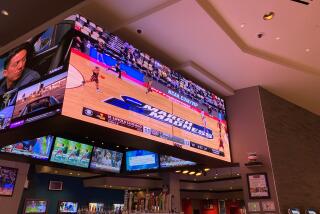Your Money or Your Life--Lebanese Risk Both : Gamblers Take a Chance at New Casinos in W. Beirut
- Share via
BEIRUT — The roulette wheels are spinning at a handful of smart new casinos in war-ravaged West Beirut, attracting some of the most hard-bitten gamblers in the world.
Braving militia mayhem, a tide of religious militancy and deepening economic crisis, the casinos are trying to woo wealthy West Beirut residents who previously could only try their luck at clubs reminiscent of Wild West saloons.
“Lebanon has gambling in its blood. We love to take risks,” said Antoine Franjeih, manager of the recently opened Casbah Club at a West Beirut hotel.
“We took a chance starting this place, and my clients take risks traveling here to play,” he added. “We are not afraid.”
The new casinos are Muslim West Beirut’s first attempt to match an illegal gambling scene that has mushroomed since the early years of the civil war in the Christian eastern sector of the city.
With East Beirut dominated by a single militia, its string of brash casinos, bingo parlors and gaming machine halls has fewer security headaches than establishments on the other side of town.
Security is strict at the West Beirut casinos, most of which operate in areas held by one of the largest militias. But the existence of half a dozen private armies in the Muslim sector keeps tension high.
Security men frisk gamblers for arms before they enter, and patrons on a hot streak are driven home with their winnings by the casinos’ machine gun-toting guards.
“Gambling is a respectable business, like foreign exchange. It goes on all over the world, so why not here?” asks Ali Zeiter, youthful proprietor of the flashy new Midway casino. He pointed out gray-suited young security men mingling with smartly dressed gamblers at the roulette, blackjack and baccarat tables.
“Sometimes my friends are afraid to come out at night, but all you notice on the guards in my casino are their badges saying ‘Security.’ The clients know very well what that means.”
Zeiter hopes his clients, some of whom regularly lay out $2,800 to $5,600 a night, will never face the gunfights that sometimes erupt among the pistol-packing denizens of the old-style clubs. A foreigner who visited one of those for the first time returned shaken.
“I saw one gambler press his revolver to the head of his neighbor who refused to leave at closing time,” he said. “The gunman seemed playful, but it was late, everyone had been drinking. I decided to leave.”
Gambling was not always so nerve-wracking in Lebanon. Until the civil war broke out in 1975, wealthy tourists from all over the world made the pilgrimage to Casino du Liban, a glittering nightspot. With its spectacular nightly floor shows, the casino helped build Lebanon’s pre-war reputation as the vacation playground of the eastern Mediterranean. But times are hard now.
“The shows stopped when this country collapsed,” said Elias abu Nader, manager of the casino’s gambling salons. “Beirut broke in two like Berlin, few roads were safe, and the really wealthy fled. The tourists have never returned.”
Today, middle-class couples fill barely a third of the casino’s luxurious salons, visits by foreign bands and dancers are rare, and a new generation of Christian rich spends its money at a network of militia-backed clubs.
Business is generally slow. Despite the expansion in West Beirut, casinos complain that only the most dedicated gamblers are prepared to play, while war keeps others away.
“There is almost nowhere to go, but I have money and I like absorbing myself in gambling, so why not?,” asked Rashid, a young, tuxedo-clad car dealer playing blackjack. “We know we can walk out of here and soon be kidnaped and shot, but if we think of that too much, we’ll go mad.”
More to Read
Sign up for Essential California
The most important California stories and recommendations in your inbox every morning.
You may occasionally receive promotional content from the Los Angeles Times.













